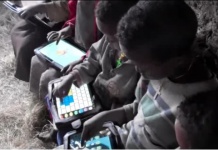 A recent post by Jennifer Serravallo, educator and author of such works as The Reading Strategies Book, shares some insights and tips into how to foster independent reading in classrooms, and unleash children’s own curiosity and eagerness to read more widely. As Serravallo says, this can have a lifelong impact. “Countless studies … have shown time and time again that students who read independently become better readers, score higher on achievement tests in all subject areas, and have greater content knowledge than those who do not.” And some of her techniques at least could be adapted for ereading as well.
A recent post by Jennifer Serravallo, educator and author of such works as The Reading Strategies Book, shares some insights and tips into how to foster independent reading in classrooms, and unleash children’s own curiosity and eagerness to read more widely. As Serravallo says, this can have a lifelong impact. “Countless studies … have shown time and time again that students who read independently become better readers, score higher on achievement tests in all subject areas, and have greater content knowledge than those who do not.” And some of her techniques at least could be adapted for ereading as well.
One technique where ereading really could make a difference is quantity of books. Serravallo believes that numbers matter. “I try to encourage schools to invest in gathering about 1,000 books per classroom library at a minimum. That will be enough to sustain a year’s worth of independent reading for a class of 25 kids.” Obviously, that’s a lot of books, and may be outside the budget of some schools. But some classroom Kindles or Chromebooks loaded up with libraries of ebooks, especially copyright-free ones? I could see that working.
Serravallo also believes in coaching children’s reading endurance skills. “Stamina is something that can be taught and it needs to be practiced. For example, you may offer students strategies for setting shorter-term goals for themselves.” That could be achievable with ebooks just as well as physical books. She also believes in “fostering joy” for kids, and cleaning out daily teaching schedules to make room for it. Sorting books by both subject and difficulty level is also something she recommends – “consider arranging your library in bins by interest topics … and put the book’s level somewhere on the book” – which could easily be done in virtual libraries as well. Ditto talking while reading: “Tap into this natural need for readers to share the funny parts, the shocking parts, and the heart-wrenching parts.” And finally, she recommends non-invasive methods to check readers’ progress and develop their skills without breaking in on their precious independent reading time.
Some may believe that the best approach of all in fostering reading skills is to keep children focused on physical books and avoid pushing ebooks at them in the first place. For classrooms that have the resources to do that, I have no qualms whatsoever with that approach. Literacy comes way before any faction fighting between pro and anti ebook camps. However, if the resources are there, why not learn how to use them? (And here’s a few tips to do just that.) I don’t think Serravallo would disagree.


































Don’t forget what you’re fighting against. None of the various testing schemes from No Child Left Behind to Common Core test and score based on independent, child-directed reading. It is difficult to imagine how they could. As a result, many school officials and some teachers consider encouraging that kind of behavior pointless because it doesn’t raise test scores.
This article in Psychology Today describes the problem.
https://www.psychologytoday.com/blog/freedom-learn/201507/k-preschool-teachers-last-stand-in-war-childhood
It’s mostly about the value of play activities for small children, but that slides over into being read to and later reading for fun. Here is what one kindergarten teacher says:
—
I teach kindergarten for 11 more days. What we are doing to the 4-6-year-old kids in this country is absolutely unethical and inappropriate. Any professional educator who truly understands how children develop—academically, cognitively, socially, emotionally—will stand up against the travesty that reformers refer to as “rigor”. Kids do NOT need to be reading by the end of kindergarten. (If they can, GREAT!) They do NOT need to be solving paper-and-pencil equations. They do NOT need to be doing “academic” workstations. They DO need to be playing, painting, building, creating, interacting with books, listening to stories, singing songs, taking field trips, playing pretend, exploring, etc. … I am leaving kindergarten, but I will be fighting for early childhood so that I can eventually go back to kindergarten. But I refuse to be part of something so dangerous to our young children.
—–
And this one:
—-
The system as a whole is broken; it is why I left the profession. Truth is, most school districts, at least the one’s I have worked in in America, do not use scientific evidence or best practices to teach kids. They instead use the next fad that comes along, “Common Core” being the latest debacle, from government bureaucracy because it comes with money or grants from the state or federal govt. and then test these kids to death until they hate school, hate learning, and wish nothing more than to get out because the ones that already are disadvantaged never measure up and continuously keep seeing their failures rather than their strengths. Worse, they test these kids in kindergarten, so the cycle of failure and frustration begins at an early age!
—-
And this sad tale:
—
As a preschool and Kindergarten teacher and trainer for over 30 years, I’ve seen such drastic changes in early childhood education—so many programs have gone from play based to skills based and the kids are losing out. … I’ve visited K programs where recess is no longer an option because “the kids have so much work to do”!! I’ve been in classrooms where young students sit at their desks and cry because they can’t do the writing the teacher is asking them to do.
—-
I experienced that myself last long ago when the “next fad” was whole word teaching of reading rather than phonetics. I remember the misery of it all. Story books filled with “See Spot run. Run Spot run,” because whole word has to teach with endless repetition of trite phrases. In contrast, phonetics quickly gives a child a reading vocabulary equal to that of their listening, which opens up a vast array of interesting stories quickly.
I was able to leap-frog past that whole word madness and teach myself to read for fun. But a lot of my classmates could not and probably to this day hate reading because their first exposure was so awful.
This fad madness is older than me. Describing the 1930s, Harper Lee blasts the whole word teaching of that era in the first chapters of To Kill a Mockingbird. She notes the absurdity of Scout’s teacher becoming upset that Scout can read at an almost adult level and points out how difficult whole word made reading for impoverished rural children.
—
One more point that illustrates why delaying ‘rigor’ for fun is best. When I was in the seventh grade, my PE class had a thick rope that hung down from the gym ceiling. Try though I might, that year I could never reach the top.
Fast forward over the summer to the eighth grade. The first day of PE, I had no problem reaching the top of that rope and never did afterward. I’d passed whatever development milestone that required. That in itself wasn’t a big deal. Lots of other boys couldn’t do what I couldn’t do, and it was only a small part of school.
There will always be a few slow learners in a class. But the travesty of this ‘rigor’ madness and teaching for tests is that it attempts to teach the great majority of kids before they’re ready, keeping them from activities that they need at their development stage, including physical activity and imagination. They need play. They don’t need formal skills.
Simply wait a few years and these kids will learn that more academic work with ease and they won’t be crushed from having it forced on them too early.
–Mike Perry, Inkling Books
P S. One way to get books for schools is to ask the parents of older kids to donate books their children no longer read. Many will be happy to see them still making kids happy.